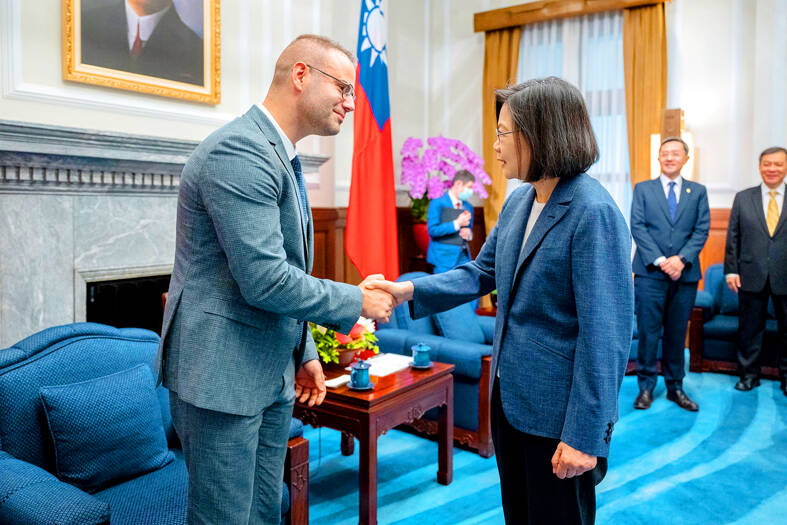Taiwan can learn from Israel’s experience in all-out defense, and bolster cooperation in fields including economics and cybersecurity, President Tsai Ing-wen (蔡英文) said during a meeting with an Israeli delegation yesterday.
The delegation, comprising six Israeli lawmakers, is in Taiwan for a six-day visit until Tuesday next week.
As military service is mandatory for all Israeli citizens, Taiwan can learn much from the country to promote its own all-out national defense, Tsai said.

Photo courtesy of the Presidential Office via CNA
Taiwan and Israel are facing challenges and threats posed by authoritarianism, but remain calm and composed, she said.
The two countries not only continue to prosper and grow economically and socially, but have also developed strong social resilience, she added.
Taiwan and Israel are important trading partners with complementary industrial advantages, Tsai said, adding that she hopes the two sides can work together to create a safer and more resilient democratic supply chain.
She also called for closer cooperation in cybersecurity, as Israel is a world leader in the field.
This year marks the 30th anniversary of the inauguration of the Israel Economic and Cultural Office in Taipei and the Taipei Economic and Cultural Office in Tel-Aviv, Tsai said.
Over the three decades, Taiwan and Israel have signed 32 agreements in science and technology, healthcare, aerospace and other areas, which have yielded fruitful outcomes, she said.
The two sides in May signed the Agreement on a Working Holiday Scheme, which promotes exchanges between young people from both countries and new opportunities for cooperation, she said.
Israeli Legislator Yorai Lahav Hertzanu said that Taiwan and Israel have a robust relationship based on their shared interests, values and ideas.
“Our societies both believe in liberal democratic values and equality, are resilient and innovative, and have vibrant civil society organizations,” Lahav Hertzanu said.
The two representative offices are crucial institutions that promote civilian cooperation in the fields of medicine and healthcare, the economy, technology, the environment and agriculture, he said.
Taiwan is an important economic partner, he said, adding that he hopes more Taiwanese businesses would invest in Israel, such as opening research and development centers in the country.
A combination of Taiwan’s strengths in hardware and Israel’s advantages in software can stimulate greater cooperation, he said.
Lahav Hertzanu also praised Taiwan’s global leadership on gender equality.
The achievement sent a clear and direct message to young people in Taiwan and around the world that “people can chase and achieve their dreams; gender is not an obstacle,” he said.

Intelligence agents have recorded 510,000 instances of “controversial information” being spread online by the Chinese Communist Party (CCP) so far this year, the National Security Bureau (NSB) said in a report yesterday, as it warned of artificial intelligence (AI) being employed to generate destabilizing misinformation. The bureau submitted a written report to the Legislative Yuan in preparation for National Security Bureau Director-General Tsai Ming-yen’s (蔡明彥) appearance before the Foreign Affairs and National Defense Committee today. The CCP has been using cognitive warfare to divide Taiwanese society by commenting on controversial issues such as Taiwan Semiconductor Manufacturing Co’s (TSMC, 台積電) investments in the

INVESTIGATION: The case is the latest instance of a DPP figure being implicated in an espionage network accused of allegedly leaking information to Chinese intelligence Democratic Progressive Party (DPP) member Ho Jen-chieh (何仁傑) was detained and held incommunicado yesterday on suspicion of spying for China during his tenure as assistant to then-minister of foreign affairs Joseph Wu (吳釗燮). The Taipei District Prosecutors’ Office said Ho was implicated during its investigation into alleged spying activities by former Presidential Office consultant Wu Shang-yu (吳尚雨). Prosecutors said there is reason to believe Ho breached the National Security Act (國家安全法) by leaking classified Ministry of Foreign Affairs information to Chinese intelligence. Following interrogation, prosecutors petitioned the Taipei District Court to detain Ho, citing concerns over potential collusion or tampering of evidence. The

‘COMPREHENSIVE PLAN’: Lin Chia-lung said that the government was ready to talk about a variety of issues, including investment in and purchases from the US The National Stabilization Fund (NSF) yesterday announced that it would step in to staunch stock market losses for the ninth time in the nation’s history. An NSF board meeting, originally scheduled for Monday next week, was moved to yesterday after stocks plummeted in the wake of US President Donald Trump’s announcement of 32 percent tariffs on Taiwan on Wednesday last week. Board members voted to support the stock market with the NT$500 billion (US$15.15 billion) fund, with injections of funds to begin as soon as today. The NSF in 2000 injected NT$120 billion to stabilize stocks, the most ever. The lowest amount it

NEGOTIATIONS: Taiwan has good relations with Washington and the outlook for the negotiations looks promising, Minister of Economic Affairs J.W. Kuo said Taiwan’s GDP growth this year is expected to decrease by 0.43 to 1.61 percentage points due to the effects of US tariffs, National Development Council (NDC) Minister Paul Liu (劉鏡清) said at a meeting of the legislature’s Economics Committee in Taipei yesterday, citing a preliminary estimate by a private research institution. Taiwan’s economy would be significantly affected by the 32 percent “reciprocal” tariffs slapped by the US, which took effect yesterday, Liu said, adding that GDP growth could fall below 3 percent and potentially even dip below 2 percent to 1.53 percent this year. The council has commissioned another institution